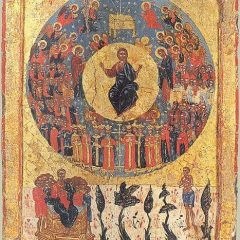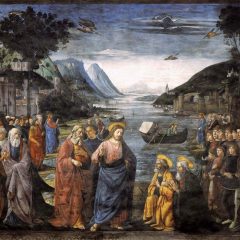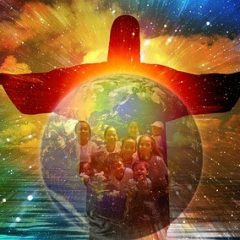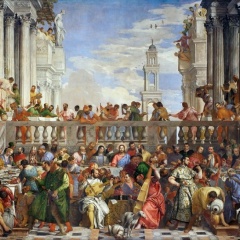kingdom of God
Christ Alone
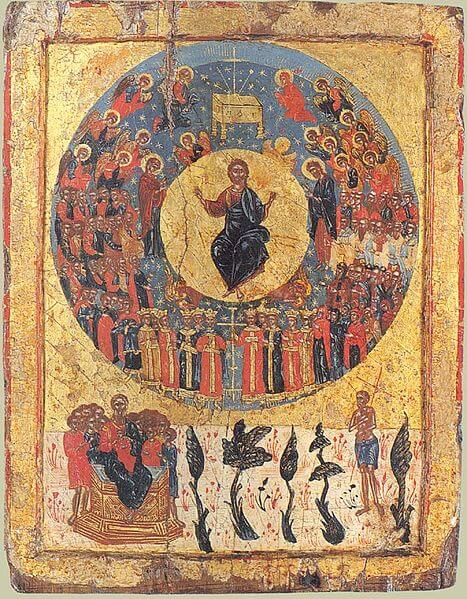
3rd Sunday Ordinary Time
Fr. Peter Robinson
Preached: January 21, 2023
In the early 1000s AD, there arose a powerful ruler, a sultan, in what is today Iran. He conquered a great stretch of territory, reaching as far west as today’s country of Turkey, accumulating great wealth in the process. As soon as he died and was laid to rest, a myth began that he would one day rise from his tomb, mount his horse, and conquer new lands. It is claimed that, for some centuries that followed, the local people kept a warhorse (complete with saddle and groom) in readiness, every day, outside his tom… waiting for the dead conqueror to rise again.
We know from 1 Corinthians that the earliest Christians were very aware that the resurrection of Christ had ushered in the last period of this world’s history. That is because, with the fulfilment of God’s promises in Jesus’ death and resurrection, everything important has happened. The end is now imminent, and St Paul urged everyone to get ready. The world as we know it IS passing away.
Yet here we are, 2000 years later — still waiting for Christ to return at the end of the age. So, what should be our attitude these two thousand years later?
Let me suggest an important, biblical principle (on which you can build your life): It is urgent for every individual (including all of us here today) to respond to God’s call to salvation. There is no time to lose; today is the day of salvation. Every decision we make counts, either toward God or away from God. Every step along the path leads us in one direction or the other.
This means we have in St Paul’s teaching today an example, where the message of the Bible must be seen as a whole -> with one teaching balancing another. When the Bible tells us, “The Kingdom of God is upon you,” it does not mean that we know for certain the day that the world will end. It could be tomorrow … but we don’t know.
Meanwhile, as Mark’s Gospel makes clear, Jesus calls us to follow him. Now is time (before Christ returns at the Last Judgement) to practise good works, works like prayer and generosity. At the last supper, Jesus taught his disciples that they had a task to do in this world. And that they would be guided by the Holy Spirit, in order to do it. So, St Paul is not teaching in 1 Cor 7 that Christians should “drop tools,” and sit waiting for the end to arrive.
Sadly, Christians have been falsely guided into doing just that. In the 1830s and 40s in the New England states, a Protestant group arose, teaching that Christ would return on October 22, 1844. On the predicted day of Christ’s literal return, large and small groups gathered in various states across the US, in homes, on farms — some say even on rooftops. From one minute after midnight of the 22nd throughout the day, they waited breathlessly for the glorious moment. You can appreciate the devastation that members of this group experienced when our Lord did not return. Grown men wept like children. People were profoundly traumatized by their disappointment, questioning God’s existence, questioning the Bible’s validity, questioning their entire sense of self.
Well then, how would the Catholic Church have us understand St Paul’s prophecy of Christ’s Second Coming?
1st. It is true — there will be a day when our Lord visibly returns to Planet Earth.
2nd. Why live, then, as if the values of this world are the ONLY realities worth thinking about (and living for)? Why become absorbed by the values of those around us? Why live as if life consists ONLY of the shopping mall, the sports centre, the cottage up north, or the upcoming championship game on TV?
3rd. We, therefore, determine to live FOR Christ (whatever we are facing, even the loss of a job, the struggles of a marriage, the breakup of a relationship). In St Paul’s words, we are “to deal with the world” but not to “become engrossed in it.” “Our time [on this planet] is growing short.” “The world as we know it is passing away.”
Sisters and brothers, we determine, therefore, to make Christ our highest value, to make him our greatest good.
Do People Experience God’s Kingdom Through My Presence?
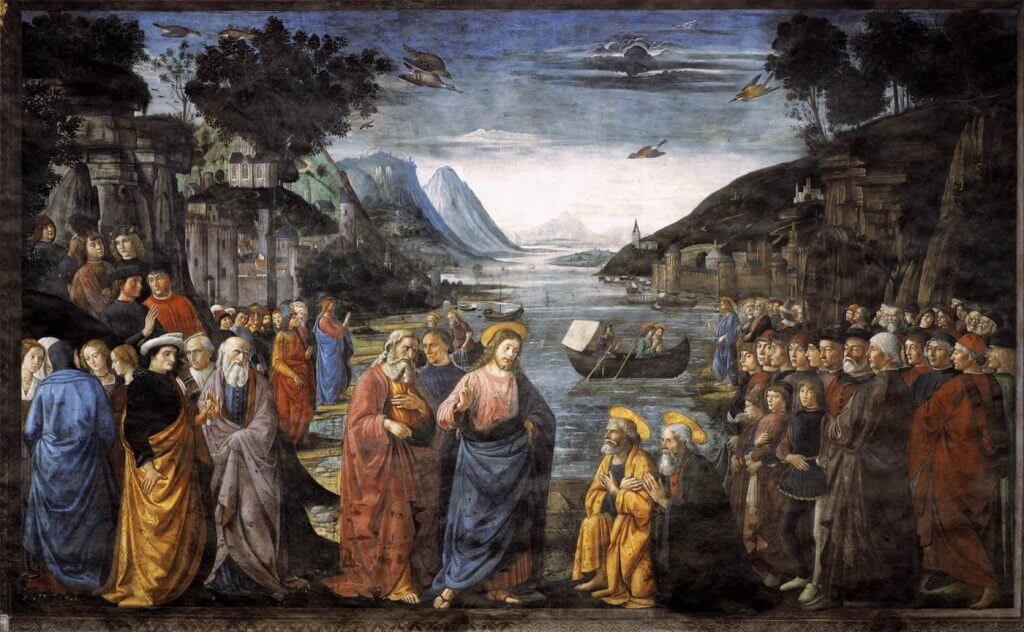
14th Sunday Ordinary Time
Fr. Mark Gatto
Preached: July 3, 2022
On Twitter this past week I saw this statement:
“If people hate you because of Jesus, that’s expected. If people hate Jesus because of you, that’s a problem.”
Jesus is sending his disciples out in pairs to everywhere he intended to go. They were to prepare the way for his visit. Jesus tells them that after visiting to say to the people, “The kingdom of God has come near to you.” How has the kingdom of God come near to them? Simply by the presence of these disciples of Jesus being there with them.
As I thought about this, I was wondering about you and me and how Jesus may be sending us out. Are we with other people in such a way that they experience the kingdom of God near to them? How do I speak with others, how do I treat others, how do I care for others? Do they experience being in the kingdom of God through my presence?
One morning this week I was sitting in the office working and Rachel was not in that day. The office door rang. So, I got up to go see who it was and what they wanted. It was a young man who sometimes drops by our church, he never really speaks much, often he asks for some food, though sometimes he will ask for communion. I am not sure where he lives or what his situation is. My initial reaction was to be bothered and just wanting to nicely send him off.
Anyways, I asked him what he wanted. He asked when the next church service would be. I told him it would be tomorrow. He asked if we could pray. So, I invited him into the office and said a prayer and gave him a blessing. I guess I felt a little guilty and remembered that I had some Swiss chocolate in my office. So, I went to get it. He went into the washroom, I am guessing he needed a washroom more than anything else. I told him I had some chocolate if he would like. He took them but then he reached into a plastic bag he was carrying and he pulled out a KitKat chocolate bar and handed it to me. Then he asked about making a donation to the church. I gave him an envelope and he slipped a small bill into it. By the end of the visit as he left, I felt that the kingdom of God was near to me through this poor unassuming man.
The Prophet Isaiah in our First Reading today, in describing God, uses the image of a mother comforting her child. This God desires to hold us, comfort us, to embrace us in love. Jesus sends us out as labourers to be with others in such a way that they experience this love of God, that they experience the kingdom of God near to them.
This is our challenge, this is our call. Who will you visit this week, who will you see this week, who will you speak with this week? In what way will you be with them so that they know the kingdom of God is near to them?
There are lots of Catholics around, but how many of us are labourers in the harvest, how many of us are being with others in such a way that they experience the kingdom of God near to them, like a mother comforting a child?
Let’s Work For A New World – The Kingdom Of God
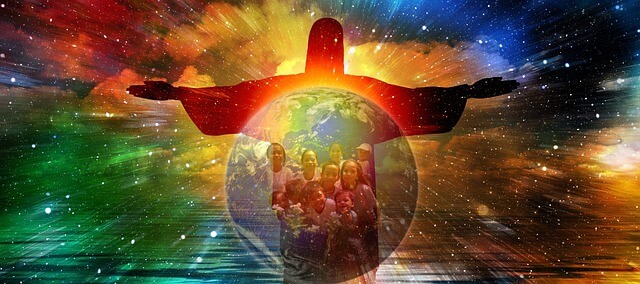
2nd Sunday of Easter (Divine Mercy Sunday)
Fr. Mark Gatto
Preached: April 24, 2022
Imagine a different world. Are you able to imagine a different world? A world without war. Without poverty. Without racism. Without anyone abandoned. A world with justice. A world where human dignity is respected. A world of freedom.
Jesus came to proclaim a new world, the kingdom of God. A world different from so much of how humanity has been. Jesus is the way to this new world, the kingdom of God.
It is for this reason that Jesus was crucified. The leaders of the Empire, the religious leaders, those in position of authority and power, they did not want a new way. They wanted to keep things the same because it benefited them. They were fine with the world as it was and they did not care about the poor, the marginalized, the weak. But, the Kingdom of God is not satisfied with a world where a few do well and others are abandoned or left on the side.
In our world today, the dictators, the powerful, the rich, still do not want things to change. They oppose anyone trying to bring about a more just world, a world in which we care for creation, a world in which there is peace rather than a military industrial complex.
After the Resurrection, the apostles, the disciples, including the women disciples like Mary Magdalene, discovered this new hope, this new vision. We see them living this new way in the Acts of the Apostles. They believed it was possible for something better. They were able to dream about a world that reflects the Kingdom of God. God’s dream became their dream and they had the courage and hope to work for it.
You and me today. The more united to Jesus we are the more that we will see the world as God sees it. We are to work to bring the Kingdom of God into our world. Begin in our own life, our own family, our own parish, our own community. Jesus is with us speaking those words in our midst, “Peace be with you.” Why did the Risen Lord Jesus speak those words? Because the disciples were not at peace. They were disturbed, discouraged, without hope. Jesus knows that first they needed peace. Then they would be able to go out with courage to be instruments of peace.
St. Teresa of Avila taught what she said was the most dangerous prayer. She said we should pray this way. “Give us whatever is good for us!” We should pray, “Give me whatever is good for me!” This is a dangerous prayer. We will not usually get what we want or what we think is good for us. We will often get something very unexpected. Only in the long view will see how it was good for us, something leading to our holiness.
As disciples of Jesus, as we experience the Resurrection, we are able to imagine a different world. A world that reflects the Kingdom of God. Work for that world in our own lives and communities. Never believe that it is not possible to make this world reflect the Kingdom of God more closely. Death is not the end, the resurrection shows us the victory over death. Even the most difficult things in this life can be changed and new life is possible.
Begin by praying that dangerous prayer, if you dare, that St. Teresa taught, “Give me whatever is good for me!”
We Don’t Own Anything

27th Sunday In Ordinary Time
Fr. Mark Gatto
Preached: October 4, 2020
We do not own anything, we do not possess anything. Everything is given to us by God for a time. We are given responsibility to care for it and use it in a good way.
The Prophet Isaiah has God speaking to the people of Israel who did not appreciate the gift of their covenant with God and did not care for this relationship. Isaiah says that God had expected justice but instead saw only bloodshed.
Jesus tells a parable to the chief priests and elders again pointing out that they did not appreciate the gift of God. Instead of caring for this they acted in a possessive way, did not use this in a way to bring justice and goodness. So, Jesus says that the kingdom of God would be taken away from them and given to a people that produces the fruits of the kingdom of God.
We should see everything in our life as a gift. As something that belongs to God and has been given to us for a time. Our response should be gratitude and a sense of responsibility, to care for it all and use it in a way that reflects the plan of God for justice and goodness.
Here are some examples of things we receive and should care for on behalf of God:
Our Life: This is a gift and we know that it is temporary and will come to an end. We are to be grateful for life itself and then want to use the life we have in a good way. That means caring for our life but also living in such a way that we are instruments of justice, goodness, love in our world.
Creation: All creation is a gift and we are called to care for it. It is not our possession to be destroyed and exploited indiscriminately. How many species are going into extinction or are on the verge of extinction? How many natural resources are being used in a way that leads to incredible levels of inequality? Are we treating the environment as our possession that can be destroyed and harmed in any way I choose? Or do we recognize that it is all God’s creation and that we are to care for it on behalf of the Creator.
Faith: Our Catholic Faith is also a gift, something to appreciate, but also something we need to care for. It is something special and we need to care for our Faith. How do you do this? Are you doing some good spiritual reading? Are you praying with the Bible? Are you celebrating the Sacraments? Are you trying to listen with your heart to ways that Jesus may be asking you to serve family, friends, your community as the hands of Jesus?
Church, Parish: The Catholic Church and in particular, our local parish community that connects us to the Church is also a gift and something that we should feel we need to care for it. This is not my church, this is not my parish, it belongs to Jesus and we receive it as a gift. We also need to take responsibility for this Church, for this parish, caring for it in union with Jesus.
Family: We do not own our family. You do not own or possess your spouse. We know the harm done in domestic violence when one spouse feels that they possess the other. Also, parents do not own their children. Children are a gift and a responsibility. You are to care for them on behalf of God.
Money: We think we own or possess our money. That leads to a very unhealthy way of dealing with money. Instead of it becoming a gift that provides us with opportunity, as something that sets us free. We become slaves clinging to our wealth and constant fear about losing it. But, any wealth we have should also be seen as a gift, given to us for a time to be used in a responsible way to bring about the fruits of the kingdom of God.
“the kingdom of God will be taken away from you and given to a people that produces the fruits of the kingdom.”
Do not look at everything and say, this is mine, that is mine. See everything in our life as something given by God. Given to us for a time and we are to care for it responsibly. Care for it on behalf of God producing the fruits of the kingdom of God. Justice, peace, love.
See everything as gift. You are to receive it with eyes of gratitude and be responsible in using it. Life itself, creation, faith, the church and parish, family, wealth, these have all been given to you for a time. Use them all responsibly and with care.
Hidden In The Weeds Of Life
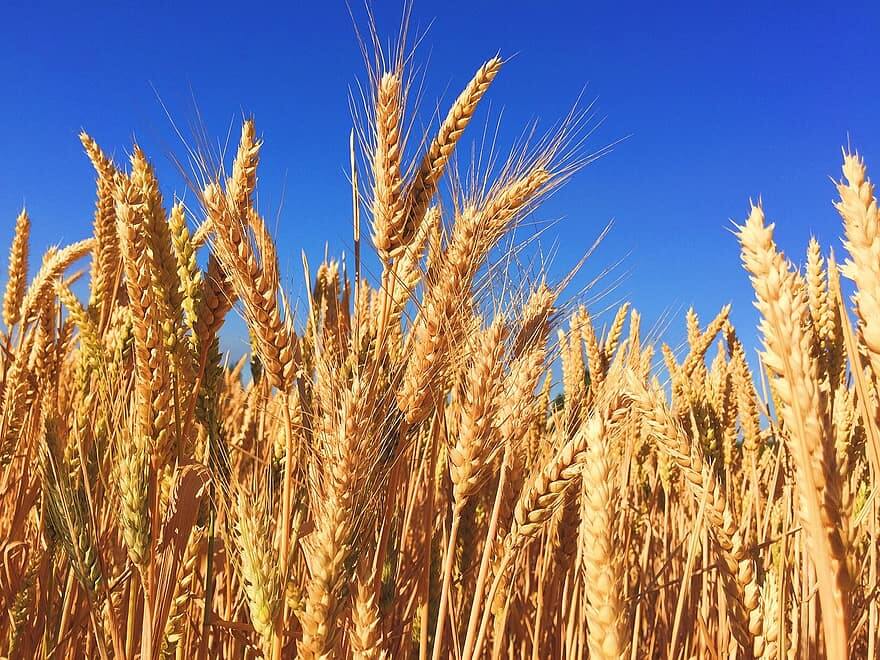
16th Sunday In Ordinary Time
Fr. Mark Gatto
Preached: July 19, 2020
What do you take for granted? Who do you take for granted? Perhaps some of you take your spouse for granted, or others perhaps take your children for granted, or others perhaps take your parents for granted, or others perhaps take your church for granted, or others perhaps take your faith for granted, or others perhaps take the beauty of creation for granted. Is there anything or anyone that you take for granted at times?
Prayer is not about saying the right words, it is about leading us into the presence of God. Then we become completely attentive to everything and everyone around us. We see with the eyes of God. We know that our spiritual life is fruitful when we no longer take anything or anyone for granted. It is about becoming attentive to the Kingdom of God in our midst.
Jesus speaking about the Kingdom of God makes it clear that the Kingdom of God is in our midst, very near to us. But, it is not usually found in powerful figures, or in military force, or in riches and the wealthy, nor in the famous. So, it often goes unnoticed, hidden to most of us. It is often hidden among the weeds of life, hard to see like the smallest mustard seed, or not seen at all like the yeast within baking bread.
Sometimes the Kingdom of God is hidden in our midst, hidden even in the weeds of our life.
During the Covid Pandemic Lockdown I think that there were a number of things that we realized we take for granted in our lives. Even just the possibility of coming to church for the Mass. You can perhaps think of some things you realized you took for granted before.
But, I want to mention just one thing that I came to realize so clearly that we can take for granted.
During this time, people could not be visited in hospitals or nursing homes. That included us as priests. That meant that many people had to die without the Sacraments and others had to die alone. To die alone or to not be able to be with a loved one as they were dying. That is something we just took for granted before.
Sometimes people ask me if it is difficult to be with people as they are dying. Something I have had to do many many times through the years as a priest. But, rather than seeing this as difficult, I see it as a privilege. To be with someone who is dying, to bring them comfort as they take that step into eternal life. To be able to pray with them, to hold their hand, to anoint them with the Sacrament of the Sick.
Early on in the lockdown one of our long time parishioners was dying in the hospital. I could not go in for the anointing. But, her two sons and elderly husband did get permission to be with her at the end. So, we arranged a phone call on speaker and I said the prayers for them and then when it was time when I would normally anoint the person, I had her son make the sign of the cross on his mother’s forehead.
We can take for granted something like the Sacraments, being present with someone as they are dying. But, surely the Kingdom of God was present in that moment as this son made the sign of the cross on his mother’s forehead while the priest prayed over the phone.
I also realize we take for granted the church funeral rituals. We are blessed as Catholics with ritual ways to pray together at the time of death. During the lockdown, this was so limited, no church funerals, only a small number able to gather at the graveside. I realized how much the funeral rituals are a gift and blessing and something we perhaps take for granted.
The Kingdom of God is in our midst, even hidden at times in the weeds of our life. We need to be attentive and patient to notice the presence of the Kingdom especially when we are in the midst of the weeds of life. Are you taking anyone or anything for granted? Let the Spirit sigh within you, to see with the eyes of God and recognize the Kingdom of God hidden within your life.
Just Like Us

22nd Sunday In Ordinary Time
Fr. Mark Gatto
Preached: September 1, 2019
I heard the Story of a priest who was visiting a L’Arche community in Europe. We will call him Fr. Frank. (L’Arche are communities where people with and without intellectual disabilities live, work, learn, and grow together). One of the founders was a Canadian, Jean Vanier. This priest who visited there was not a well man. He was recovering from a nervous breakdown and, although feeling stronger, had not yet regained full health.
On this particular day, the priest who was scheduled to celebrate Mass with the community did not show up. Fr. Frank offered to help. The people gratefully accepted and together they began to pray the Mass. But within a short time Fr. Frank became very nervous and lost all confidence. He stumbled and mumbled his way to the end of the Mass, feeling devastated and humiliated. How upset he was to have let the community down in this simple task! He wanted to run away and hide from the people who saw him in his weakness and helplessness.
After Mass the people came forward and hugged him. They were smiling and crying at the same time. They were saying to him that this was one of the most beautiful Masses they had ever been to! Fr. Frank could not understand their exuberant joy, as he was feeling the opposite.
Resisting their praise, he said, “How can you possibly describe this Mass as you have?” They replied, “But, Father, you are just like us. Thank you!”
These people, so often rejected by society, had recognized something of themselves in this priest as he celebrated the Eucharist. He truly represented Christ among them.
Who feels welcome in our parish, our church? The elderly, those coming on Darts and with walkers, children even when they are distracting, those struggling with mental illness, with depression, people finding life difficult now for various reasons?
Jesus tells the Pharisee that when he gives a banquet he should “invite the poor, the crippled, the lame, and the blind.” This is a symbol of the Kingdom of God, the God who receives all, who welcomes with special care those who seem unable to offer anything in return.
The humility that Jesus speaks about is not about putting myself down, but about raising up others. To be secure enough in myself that I do not need to put others down. Then I can be weak in front of others and others can be weak in front of me. Then we recognize each person as welcomed into the Kingdom of God. If God receives the other, how can we not receive them?
Our parish, our church, should be a community, a home where all feel welcomed, where all of us are able to be weak in front of each other. Where all are then lifted up in the grace and mercy of God.
Who Belongs In The Kingdom Of God? – Fr. Mark

26th Sunday In Ordinary Time – Year B
Fr. Mark Gatto
Date Preached: September 30, 2018
Who is on the side of Jesus? Who belongs in the Kingdom of God? We live in a very polarized world. People tend to belong to one group or one tribe or one side and everyone on the other side is always wrong and to be rejected. There is no chance for dialogue, no chance to work together on any common cause.
We see this polarization in many different areas of life, including politics throughout the world. It is not that long ago that we saw that polarization within Christianity, between Catholics and Protestants. We would never pray together, saw the other as heretics, would avoid being in their presence, excluding them. It seems that we human beings tend to want to join a group, a tribe, that is exclusive, where my side is always right and the other side is to be excluded.
This is not something new, we see the disciples of Jesus in today’s Gospel doing the same thing. They go to Jesus upset because they saw someone casting out demons in the name of Jesus. They wanted to stop him. Why? They say, “because he was not following us.” He is not on our team, our party, our group. They want to exclude him from the side of Jesus, from the Kingdom of God.
But, Jesus rejects this exclusive way of thinking, this polarized thinking that divides and separates. God is not as narrow as we human beings can be at times. God is not so small. God is at work in much broader and wider ways than we think. God is not limited to the church or to Catholics or to so called holy places. The Kingdom of God is not so narrow and exclusive as we can be at times. In fact, the word “catholic” means universal. As Catholics we are to embrace all cultures, all lands, all languages, all people of good will. We need to watch not to limit where God’s Spirit may be at work outside of my group.
How do we know if I am on the side of Jesus, if I belong in the Kingdom of God? It is not that I believe or think in a certain way. Most importantly, it is by what I do. If I look at how I am living my life, how I am behaving, does it reflect the way of Jesus, does it reflect the Kingdom of God?
This is why Jesus speaks so strongly about our need to reject sin from our life. Sin matters, it is serious. Sin damages our life and damages the lives of others. So, Jesus uses strong language, “if your hand causes you to sin, cut if off, … if your eye causes you sin, pluck it out.” Any behaviour or way of acting that leads us away from the way of Jesus, from life in the Kingdom of God, needs to be cut out.
Example: In World War II, the great evil of the Holocaust taking place in Nazi Concentration Camps, seems so evil and unbelievable. Yet, many involved in this were just ordinary citizens, otherwise decent people. With families, children. They cooperated with this evil, went along with it. They would say that they were just following orders, just doing their duty. They were just being obedient.
Well, if your boss orders you to do something immoral, unethical, that you know to be corrupt, do we go along with it to keep our job? Is this not a case of where we need to cut something off in order to remain in the Kingdom of God?
In our second reading, the Apostle James speaks about rich people who became rich through exploiting others, who made riches the most important thing in their life. He describes how their riches have rotted, their clothes are moth eaten, their gold and silver is rusted. At the end of life, this is what happens to all of our so called riches. The question is, “What is your treasure?” If someone was to look at your life and how you are living, what would they see is your treasure?
So, who is on the side of Jesus? Who belongs in the Kingdom of God? God’s Kingdom is much broader, much bigger than our small thinking. Look at our behaviour, what I am doing. Anything that leads me away from goodness, into sin, we need to cut it out from our life. At the end of life, the question will be, what did I treasure, where was my heart?
We need to show by our life, by our decisions, by our priorities, that I am a follower of Jesus, that I belong to the Kingdom of God.
All Nations Enter the Kingdom of God – Fr. David
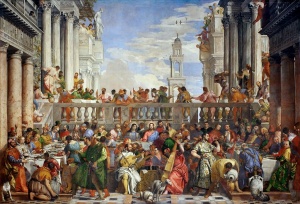
All Nations Enter the Kingdom of God
28th Sunday – Ordinary Time – Year A
Fr. David Reitzel
Preached: Oct 15, 2017
If we follow the order of Christ’s ministry as laid out by the gospel of Matthew, we see that Matthew has Jesus teaching His parables in two large chunks. The first group of parables takes place shortly after the Sermon on the Mount near the beginning of Jesus ministry and is directed toward the crowd of followers who began to flock to him. The content of these parables was primarily a description of what the kingdom of heaven was like: the kingdom of heaven is like a mustard seed or like yeast in a measure of dough. In other words, the kingdom of heaven grows slowly and imperceptibly, but it will end up being a very large kingdom. The crowds walked away from these parables pleased.
The second group of parables, on the other hand, takes place near the end of Jesus ministry, just before He was to make his last journey to Jerusalem in which he would be crucified and then rise again. These parables were directed not to the crowds but to the Pharisees, Sadducees and elders of the people, and the content of these parables was less about what the kingdom of heaven is like but rather who gets to go there. For the last five weeks in the church we have been listening to these parables and today’s was the last one. Last week we had the parable of the vineyard owner who rents his vineyard out to bad tenants. The week before we had the slaves who were hired to work in the fields, some at the beginning of the day, some in the middle, and some at the end. And the week before that we had the parable of the two sons who were asked to work in their Fathers field, one went, the other did not. All of these parables centre around the question, who gets to enter this new kingdom of heaven that Jesus is preaching about.
Today’s parable follows the same question. It compares the kingdom of heaven to a wedding banquet, and when everything is prepared the guests are called, but everyone is too busy to show up. Luke provides more detail than Matthew, he tells us why they were too busy. One person had just bout a field, and needed to see it, another just bout some oxen and needed to test them. They were all too busy with the cares of the world to celebrate the wedding banquet of the king’s son. Matthew’s account is a little more dramatic. He has these same people mistreating the salves and killing them. This echoes the events of the parable last week where the tenants who were renting out the masters vineyard killed the slaves that were sent to them to collect the master’s share of the harvest. And just like last week, the king in the parable today responds by destroying those people and then inviting others to the banquet.
If this parable is about who will enter the kingdom of heaven, then everything hinges on who are those people that the king rejects, and who are those new people that the king accepts.
Who were these ones who were too busy to celebrate with the king, and so violent that they mistreated and killed his slaves? Well, remember Jesus is talking to the chief priests, the scribes, Pharisees, and elders of the people. These people represented the kingdom of Israel, the chosen people, who had been in fact called first by God when he called Abraham to follow him.
It was clear to the Jewish leaders that listened to Jesus, that he was talking about them. They had been invited to the banquet but did not respond, they had been asked to follow Jesus and said no, and so in the wedding banquet of the kingdom, they have been rejected. And as if this wasn’t bad enough, others have been invited in their stead. The gospel tells us that the king went on to invite anyone, good or bad to the wedding banquet. Jesus is revealing to the Jewish leaders that God is no longer just considering the nation of Israel as his privileged people, he now invites all people into his kingdom, Jew and Greek, slave and free, women and man.
This would have been heresy to the Jewish leaders, the thought that non-Jews would receive a favored place in the kingdom of God was unthinkable. But if they simply looked at their own scriptures they would have found it.
Our first reading from the prophet Isaiah says, “on this mountain the lord of hosts will make for all peoples a feast of rich food, a feast of well aged wines.” When Isaiah uses the word “nations” he is not just referring to the Jewish nation, but all. Isaiah gives a foretaste of what Jesus will fully reveal, that the kingdom of heaven is for everyone who responds to God’s call.
But what does that have to do with us? Well . . . Everything. My ancestry is German and while God was teaching his chosen people of Israel how to worship him, my people were in the Black Forest hunting wild beasts, pillaging villages, and making sacrifices to the countless local gods of the land. My ancestors were the people that Israel was instructed to stay away from. But the fact that today I am able to worship the same God as Israel, to be a member of the same kingdom, is only thanks to the fact that God’s election, while starting with Israel, grew to all who answer the call to follow his Son. And, unless you have Jewish ancestry, you are in the same boat as me. We should look at this parable and rejoice for if Jesus had not opened the Kingdom to all nations, we would still be lost in our sins.
We who have grown up in Canada, where all nations live together, in the Catholic Church, where all peoples are invited, (the word catholic means universal after all), I think we take it for granted that all peoples are welcome to enter the kingdom of God. But I think we would give greater thanks to God if we reflected upon the fact that this was not always so. In the beginning all were not welcome, non-jews were considered lost souls, but thanks to the sacrifice of Jesus Christ, you and I can be saved, and enter into the wedding banquet of the Kingdom of God. Today let us reflect on this, and the give thanks.
